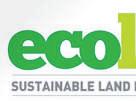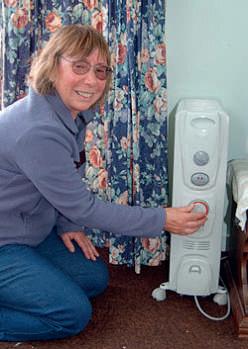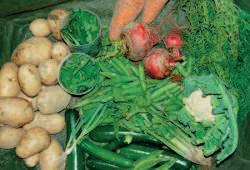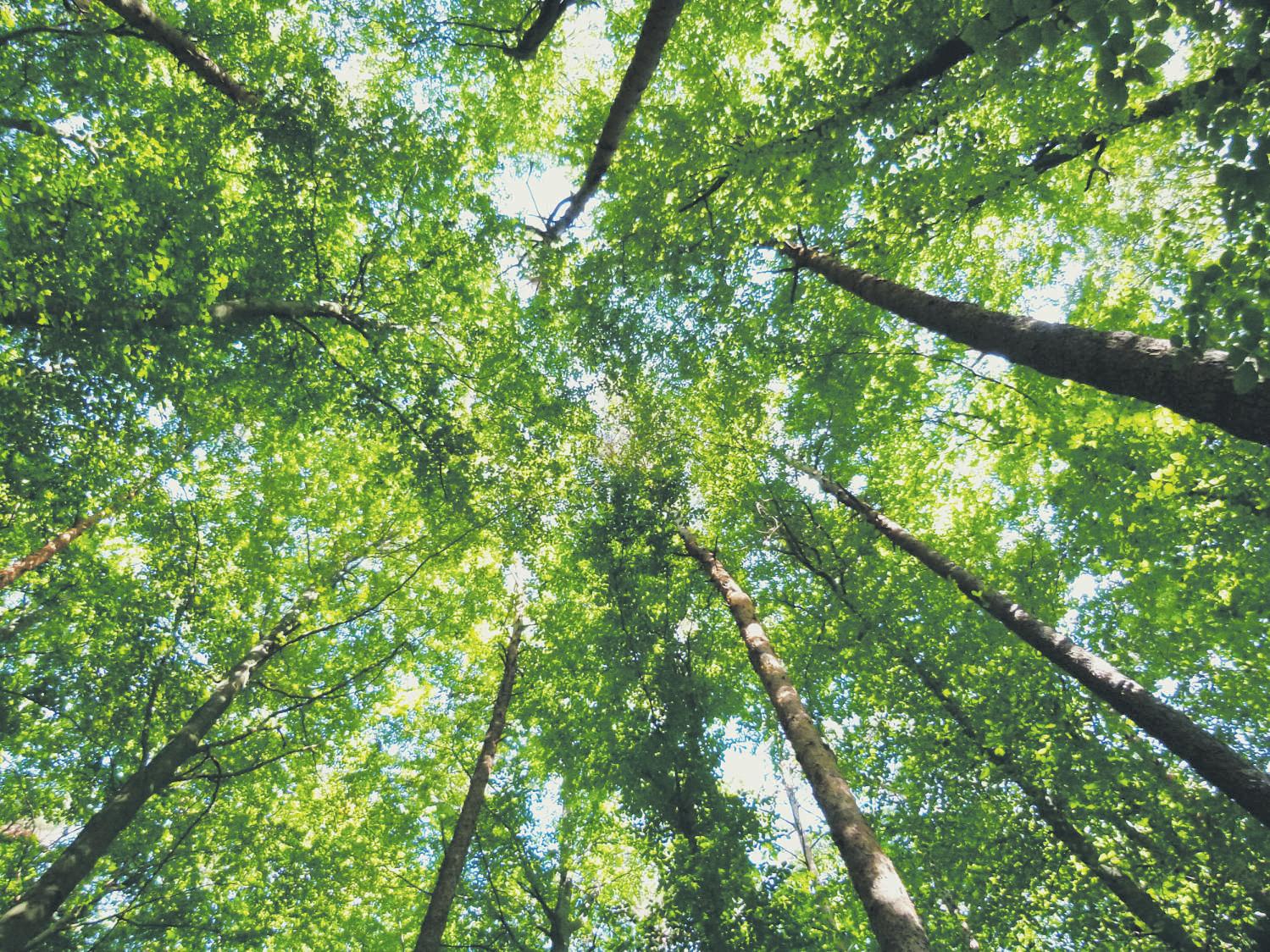





































































































































































































































Lifestyles arechanging, in awarmer,moreresource-hungryworld.
Areyou ready? Find out moreatsustainableliving.org.nz.
The Sustainable Living programme is apractical, funway to learn and use actionsthat reduce your environmental impact.Itoffers you futureliving skills for ahealthier lowerwaste lifestyle. It’sanew approach to making smart, affordable and lower-carbon consumer choices in New Zealand.
14 District and City Councils aremembers of the Sustainable Living Education Trust, and in autumn 2019 they’ve been joined by

the Ministryfor the Environment, so that you can now download our learning guides, free anywhereinAotearoa NZ. Yousimply need to register your email and home address.
From the eight learning guides, see how to make ahealthier,drier and warmer home and how you caneasily reduce yourwaste to landfill. Other topics ready to explore are: home organic food growing, water use efficiency,avoiding toxic chemicals, smart healthy food shopping and preserving tips,

and how to reduce yourpower bill. The learning guides include eco-buildingdesign and house renovation ideas, lower-carbon transport options, and communityresilience in emergencies. All have apractical focusand areindependent of commercial bias
Our charitable trust has designed the education programmefor anet-savvy public, so we no longer rely on tutor-taught evening courses,although they arestill recommended whereavailable in member Districts.
Youcan use Sustainable Living materials to support alearning group on futureliving skills, which could be home-based with neighbours,orata community venue, environment centreorinyour workplace.
Etransformin dramaticall areatrisk world extr each year destr planet does order to safeg drastic changes It’ scale corpo agricultural policies. society’ way of life district, salute dif contribute in Northland. centr local food emissions ensur in Northland climate and and our Whangar testament and ever fantastic range with afocu packaging bring their thanks to support we Trade District
Kaiwaka’s EutopiaCafé is open

Amust see whimsical artextravaganza, Our tastyand colourful dishes compliment the surroundings and our organiclocal Rush coffees and lattes arefast becominglegendary.
The game changer that will re-define the futureofour forests. All it requires now is your help to make this change happen.
The latest in Pest Control…. enviroMate 100TM enviroMate 100TM



is now available from Eco-Land.


It is notonly artand food, we are working hard to implement ecological principles andminimise waste. Most produce comesfromlocal organic gardens,weonly use free range eggs and our water is heated by the sun.
Open Tuesday -Sunday 7.30-4
1955 SH 1Kaiwaka
Ph 09 4312222

www.facebook.com/eutopiacafe

Earlier thismonth the United Nations released ashocking new report into the state of our planet, apparently us humans are transformingearth’snatural landscapes so dramaticallythat overone millionspecies areatrisk of extinction. All around the world extreme weather events areincreasing each year withdrought, flooding and fires destroying communities, homes and habitats.
We areall, at the veryleast, awarethat our planet doesn’thave endless resources and in order to safeguarditfor thenext generation drastic changes mustbemade on all levels. It’seasyofcourse to point the finger at large scale corporates, intensive manufacturingand agriculturalindustries or greedy government policies.
However,for change to happen andtoshift society’sfocus on amorelocal and sustainable way of life we need to look to ourown district, salute those who aretrying to makea difference and see how weasindividuals can contribute towards this movement right here in Northland.
Some of the key principlesofsustainability centrearound eating locally and encouraging local food supply,reducing waste and carbon emissions and futureproofingour homes to ensurewater and powerconservation. Here in Northland we’reblessed withthe perfect climate and soil to grow avariety of produce and our Whangarei Growers Market is testament tothis.
It’sbeen going for over twenty years and everySaturday rain or shinethereisa fantastic range of locally sourced produce with afocusonecologically friendly packaging and encouraging customers to bring their own containers. In Whangarei thanks to ahuge local campaignand support we becameNew Zealand’sfirst Fair Trade District and Council, proving that in
Northland thereisamomentum to encourage sustainability at home and in ourworkplaces.

Our Fair Trade District status has been awarded due toalarge andgrowing number of local community organisations, workplaces and faith groups showing their support by either using or selling Fair Trade products. WhangareiDistrict Council got on board and now ,as one of four Fair Trade Councils, puts afocus on responsible procurement and encouraging support of Fair Trade products.
Climate change policy is alsoapriority for the current governmentand the recent methane gas emission reductionby10% has been welcomed by many of those concerned about the impact of intensive dairy hereinNZ.
In Northland we’reseeing ashift towards forestryand horticultureasthe newprimary industrystars. Many farmersare diversifying into avocado or fruit production, with strong financial yields and the addedadvantage of zeroair miles to feed our region, agrowing horticultureindustrycould be akey factor to amoresustainable and environmentally friendly primaryindustryinthe district.
Fortunately,those in government have recognised the benefits of athriving horticultureindustryinNorthland and anumber of ProvisionalGrowth Fund allocations have been made to further amore environmentally sustainable region here in the north. Arecent PGF announcement has earmarked $18million to investigate water storage to unlock land use potential in the Mid North.
Improved access to water can give landowners greater options to utilise their land, develop newmarkets and maintain and grow askilled workforce as well as giving our district greater self-sufficiency and less dependency on costlyfruits andvegetables sourced elsewhere.
Local organisations have also got on
boardand aremaking attempts to think and act in more environmentally positive ways.Whangarei District Council, as well as being aFair-Trade Council is also amember of the Sustainable Business Network, an organisation devoted to empowering business people to make things better for people and our planet. The Council is busy working on many initiatives around it’sSustainability Strategy,they’ve recently conducted an internal waste audit focused on reducing waste and areworking through their procurementpolicies in order to source more sustainable products.
They’realso making contributionstoward Whangarei’sstatus as NZ’smost electric car friendly city with four electric cars in the Council fleet and have begun work on building asuper-fast charging station to add to thethirteen standardcharging stations located all around Northland. The Northland Regional Councilshould also be congratulated for its commitment to sustainability with 13 EVs in operation out of its fleet of 30 NRCvehicles.
Last year Kerikeri Retirement Village became thecounty’sfirst retirement community to purchase afleet of four EVs for residents andstafftoshare, an impressive example of how even older generations recognise theimportance of making greener choices and reduce our environmental footprint.
Thereare also some verypositive initiatives around education andensuring the next generation looks afterNorthland’sprecious resources and preserves our district for future generations.
Local Whangarei business EcoSolutions runs environmental educationprograms in schools and offers public seminars
on variousecologically positive topics such as composting andwaste reduction. EcoSolutions is part of the CBECnetwork (Community Business and Environment Centre) whichisacommunity enterprise operating arange of businessesand environmental programmes as part of an overall effort to build sustainable local economies in the communities we live in.
Northland’scommitment to move towards amoresustainable way of living was highlighted this year by thehuge volume of entrants in Northland Regional Council’s inaugural Environmental Awards.
Over 90 entries were received in the eight categories which is testament tothe volumes of amazing Northland individuals, communities, businesses and schools who feel empowered to stand up andmake changes towards amoresustainable way of living and working together.
It’sveryfittingthat theoverall winner was local early childhood centreComrie Park Kindergarten, responsible for setting young children on thecorrect path towards caring for our environment. Head teacher Anna Alexander explains that as part of the Enviroschool program their missionisn’tjust to educate young minds on recycling and waste but to foster an overall sustainability in our communities, families and whanau. “It’s about kindness for ourselves and the entire living environment, and wereally believe in the importance of sharing our knowledge with these little people and empower them to use these principles through life.”
With the increased spotlight on our fragile planet andmomentum growing for living moresustainably,perhaps leading by example and education can preserve our beautiful region and its resources.
At
Showhomes:
When Northpower helped to kick-start New Zealand’selectric vehicle journey back in 2014, few people could have foreseen where that would lead.

The first ever fast charger in NZ was installed in 2014 atNorthpower’sAlexander St substation in Whangarei’sCBD, capable of charging acar within 20 minutes.
In the years following, Northpower added afurther three slow charging units to the substation, along with 15 at various locations around Kaipara and Whangarei. Then came ChargeNet with their fast charger deployment which Northpower helped install in the North. Kaiwaka was their first location, followed by another 13 around Northland –providing arobust network of chargers to overcome issues of ‘range anxiety’
Fast forwardfive years and the EV landscape in New Zealand has evolved dramatically.InNorthland alone thereare now 14 fast chargers, morethan 25 publically available slow chargers and over 420 EVs registered in the region –six of them in Northpower’sNorthland fleet as we look to play our part in reducing our carbon footprint.
New Zealand has over 250 public charging stations listed on PlugShare– awidely used app for locating charging stations. ChargeNet alone accountsfor 149 EV fast chargers in operation nationwide and has a further 57 installations underway.Moreand morecharging stations arebeing added to PlugShareeveryday
According to EECA,with over 200 fast chargers for nearly 14,000EVs, New Zealand’sratio of chargers per EVisfar better ratio than the EV earlyadopters Norway, which has 1200 fastchargers servicing over 330,000 EVs.

For Northland, everyEVregistered in the region is another step in the right direction towards reducing CO2 emissions and creating amoreenvironmentally sustainable future With New Zealand’senergy coming from predominantly renewable sources, powering
According to EECA,withover200 fast chargers for nearly 14,000 EVs, NewZealand’s ratioofchargersper EV is far better ratiothanthe EV earlyadopters Norway,whichhas 1200 fast chargers servicing over 330,000 EVs.
vehicles from electricity rather than fossil fuels delivers significant reductions in carbon emissions.
According to EECA, transport is responsible for about 18% of New Zealand’s total greenhouse gas emissions each year (and 45% of energy-related emissions). Therefore, one of the most effective ways to reduce our total emissions is by transitioning our fossil-fuelled transport fleet to run on clean, renewable electricity
Not only do EVsmake environmental sense, but talk to any EV owner and theylove how much money they aresaving by driving an EV rather thanapetrol or diesel powered vehicle. Using aresidential off-peak electricity rate means you can charge your EV for the equivalent of 30c alitre, compared to petrol and diesel, says EECA andanumber of EV owners.
Northland EV owners using their vehicles
daily areenthused about the fact you don’t have to warm the car up to get the engine running smoothly,the heaters work straight away and you don’tever have to go to the petrol station and worryabout kids nagging to buy lollies! Charging your EV at home at night or at work during the day makes life easy
The amount of charging infrastructurenow in Northland, combined with our renowned tourist attractions, means that we areone of the most desired regions for EVowners to visit because thereisacharger nearby wherever you areinNorthland.
However,thereistalk that at least 40 more EV chargers will be neededinthe next few years throughout Whangarei and Kaipara Districts to support the on-going growth in EV numbers.
Northland Regional Council’sJoe Camuso
says aTeslaSuper Charging Station in central Whangareiisplanned later this year and moreoftheseopportunities willattract EV owners totravel to Northland.
Although Northland ledthe charge and initially hadthe highest EVuptake inthe country, we now ranksixth against allother regions in the countryfor EV ownership per 1000 people, with 2.5 EVsper 1000 people. However,EVs arequickly becomingmore affordable, so uptakeinNorthland andNew Zealand will increase steadily
And let’sface it –the energy used to power EVs is New Zealand made and is clearly our most sustainable transport fuel so why wouldn’twe do whatwe can to embrace it sooner rather than later
Thereare some great resources available for thosewho arethinking of buyinganEVor who would like to know more. For example Drive Electric (driveelectric.org.nz) and EECA(eeca.govt.nz)both have extensive information, fact sheets and resources for thosecurious about thebenefitsofEVs.
Northland has an amazing opportunity to capitalise on the electric vehicle journey and reduce energy costs and our carbon footprint at the same time.■ OscarBoyd,10 thinks EV’sare good for the environment and the futureofcars. He’s with Rachel Wansbone Customer Excellence ManageratNorthpower at the EV gathering at Whang rei’sGrowers Market.
Waitiki Landing
Houhora
CoopersBeach
Kaitaia
Waipapa
Kerikeri
Opononi
Kaikohe
Kawakawa
Dargaville
Matakohe
Tutukaka
Tikipunga
Raumanga
Town Basin
Northpower
Alexander St
Ruakaka
Marsden Cove
Mangawhai
Kaiwaka
Formoredetail on EV charging in Northland go to: plugshare.com chargenet.co.nz
Sounds like abig question that can make your headspin just thinking about it.Trying tochange our behaviour that negatively impacts on our environment all at once is impossible.
What if therewas one simple action that we could all take each daythat would begin the process for us?
All forms ofmetal start their life when someone digs up a piece of our planet. Gold, aluminium, copper,steel, all started as particles of our precious planet. We have beendigging away for centuries making new metals for new products.
The great thing is that
each time we produce anew metal product made from those precious particles of our planet it begins it life of FOREVER RECYCLING.

BUT ONLYIFEACHAND EVERYONE OF US MAKES THE EFFORT TO KEEP THEM IN THE RECYCLING CHAIN.
Products made of metals can easily find their way intolandfill if not taken careofatend of life. Once they areinlandfill, they arelost to the circular economy forever It’snot difficult to start saving our planet one drink can, one old washing machine, or rusty bike at atime.
So have ago!!
Don’tdropthat baked bean can in the bin under the bench -put it in your recycling bin.

Don’tleave that old bike or old car batteries in the back of the shed bring it in for recycling.
ANDESPECIALLY
Don’tthrow that drink can out the window of your car
Your local Metals Recycling Facility (scrap metal dealer), welcomes all forms of diverted metals. For some of the products you will even be rewarded with payment. Others are costly to preparefor the recycling process so thereisnopayment at the point of drop off.


PAYMENT OR NO PAYMENT YOUWILL STILL BE DOING AGREATJOB IN SAVINGOUR PLANET
We area Northland owned Scrap metal company,Our Scrap metal yardislocated at 482 Marsden point road, Ruakaka. Our friendly team travel the wider Northland region to collect scrap metal. Call us if you need to know more.


Sports Clubs and community Groups can organise acollection of their unwanted recyclable metals for us to pick up. This way they can raise money for their clubs or organisations at the same time as saving the planet. Done!
Now you arepart of our circular economy and you arehelping to save the planet. Welcome aboard.
Margaret uses a thermostat and atimer on her oil-filled radiator to control exactly when it turns on and off, so that this room is warm before she arrives, without wasting electricity Sometimes getting the right technology is a better investment for comfort and efficiency, than relying on remembering to turn heaters on and off

SAVE ON POWER BILLS
Other easy actions to trim electricity bills include:
•Checking that your current retailer is best value in your area. TrySwitchMe website or Glimp. Note that theremay be cost penalties if you switchprovider morethan once a year!
•Keep lids on cooking pans and pots; don’tover-fill the electric jug -ittakeslots of power to make steam, and then morefor afan to vent it from the room!
•Ifrooms are overheating in summer,shade the West-facing windows instead of running aninvertor heat pump as cooling.
•Dry clothes outside on lines instead of in adryer.The UV light helps kill bugs too but may also fade somecolours.
•Close curtains at dusk in winter to keep warmth in, and have them wide open on north-facing windows by day
•Ventilate bathrooms and kitchens to outside, toremove steam -dry air is easier and cheaper to warm thanwet air,and you reduce mould too. Modernextract fans are power-efficient and bathroom fans can be run on delayed auto-switch off.
For many morepossible actions, and details of how to select small investments in equipment or materials that will pay for themselves (suchaswheretospend first on home insulation) gotowww.sustainableliving.org.nz/actions for a link to our Energy learning guide.

Your place might be aunit in arow,anold villa, amoderncity apartment or asmall rural eco-house (like this MasterBuilders award-winning Canterburyexample) but whatever your type of home, the best opportunity to consider sustainability comes when it is renovated, repaired or designed from new Not all architects and builders understand sustainability principles, although many arelearning, encouraged by HomeStar,the Green Building Council and the Master Builders/Resene Sustainable Home Award. As their client you have to know what to startasking for,such as:
•Orientating rooms and roof to benefit from winter sun’s warmth,but protected from summer sum overheating
•Including enough sun-lit solid stuff (thermal mass) to store heat overnight in floor or walls
•Insulatingtokeep winter heat in -atabetter level than the disappointing minimum of NZ Building Code
•Designing-in the ventilation, to get rid of steam yet retain heat
•Using clean heatingand you’d know if you prefer radiant warmth (radiator,woodstove) or convected (air heater,heat pump) for personal comfort
•Design that minimises wasteand toxins during construction, decoration and in later use.

•Ifwater can be solar heated and what you will use to ‘top up’ the water heaing in winter
Our learning guide on eco-buildingand renovation takes you through some key stepsand builds your confidence and know-how,ready for when you meet the trades people and builder.Wehelp you to think about the whole system of the house, not just add expensive gadgets that asales rephas promoted, regardless of your needs.

Here’saJanuaryday’sharvest, from aSustainable Livingtutor’s garden: potatoes, courgettes, peas, cauli,Mesclun salads, beetroot and carrots. All were compost-grown organically without chemicalsprays or fertilisers.
Simply wash offthe soil and enjoy great flavours; plus the significant enjoyment and some exercise, that came from growing them at home. Your home produce quantity and variety could be increasedby:
•Converting sunny lawn areas into cropping spaces. Veges can be decorative and fashionable too: think French style Potager!
•Adding some glazed, polythene or cloth shelter to extend the spring and autumn growing seasons andbeat frosts
•Growing only veges and fruit that you like and perhaps varieties that the shops don’toften stock making raised beds on areas whereexisting soil is damp or unsuitable surface such as concrete.
•Making more compost volume by feeding the compost boxes with pea straw,newspaper,manures, neighbour’s kitchen scraps
•Saving rain water for irrigation, and/or using timers on hoses from the tap
•Learning how to grow crops from seed and sharing seed packet costs with friends each spring
•Learning about how to deter,divert or control pests without poison sprays
•Bartering your surplus, or preserving it, in exchange for what neighbours grow.


The Matariki Tu Rakau Programme (led by Te Uru Rakau ForestryNew Zealand) will seecommunities across the countryplant up to 350,000 native trees during Matariki. Matariki is atraditional time of harvest, thanksgiving and remembrancearound Maori New Year,and occurs in the middle of the tree planting season.



Whether large or small, these stands of trees will create living memorials for our fallen and returned soldiers; and mark the 100-year anniversaryofthe end of the First World War. The programme is apart of the government’sOne BillionTrees initiative.
ForwardWhangarei have partnered with

kaupapa is to help enable and empower our community tocreate acleaner,healthier, moresustainable Earth -and so we think that planting trees is agreat way to do this” says Laura Welsby,the owner of Forward.
Forwardhavethereforecreated the Tree Team project, in which they have collaborated with arange of organisations andplanting groups to create ajam-packed calendar of planting events this season. “Wewant to bring our community together, through tree planting, to get hands on and enjoy looking after our environment” says Laura. “It’salso a really special opportunity to create alasting legacy that futuregenerations can enjoyand benefit from. In years to come the Tree Team that
Laura at contact@forwardwhangarei.co.nz / 0204 080 6650. Delicious kai will be served at the completion of the plantings and a commemorative plaque positioned to mark the significance of the area. Join the Tree Team and help plant 50,000 native trees across Northland.